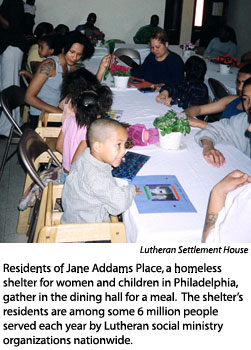BALTIMORE — Leaders of The Lutheran Church—Missouri Synod (LCMS) and the Evangelical Lutheran Church in America (ELCA) discussed their denominations’ cooperative ministries when they met Oct. 24 here at the Lutheran Center. The ministries address domestic disaster response, immigration matters, social services, and international development and relief.
The Lutheran church leaders, meeting as the Committee on Lutheran Cooperation (CLC), normally meet twice a year to discuss their common witness and p rovide updates to each other about current joys and concerns within their church bodies.
rovide updates to each other about current joys and concerns within their church bodies.
The leaders spent considerable time discussing their collaborative ministry through Lutheran Disaster Response, focusing on different understandings of the ministry that have emerged in recent years. Rev. Matthew C. Harrison, executive director of LCMS World Relief and Human Care, and Rev. Rebecca S. Larson, executive director, ELCA Church in Society, agreed to continue discussions about the ministry and return to the CLC with recommendations for the future.
At this meeting, the leaders met with executives who lead Lutheran Immigration and Refugee Service (LIRS), Lutheran Services in America (LSA), and Lutheran World Relief (LWR), all based here:
- It’s been “a tough year,” and the climate is not favorable for immigrants, who are “vilified” on talk shows and by comedians, said Ralston H. Deffenbaugh, LIRS president. The church’s role in immigration matters is to care with dignity for all people, he said. It was a serious blow to U.S. immigration policy when reform efforts collapsed in the U.S. Congress last June, likely meaning that Congress will not revisit the topic until a new president is in office, Deffenbaugh said. Refugee admissions to the United States are down considerably, he said, including numbers of Iraqi refugees admitted. Of the 7,000 Iraqis the United States planned to admit in 2007, about 1,600 have been admitted so far this year, Deffenbaugh said.
- Lutheran social ministry organizations serve 6 million people annually, about 1 in 50 people, said Jill A. Schumann, LSA president. The value of LSA’s combined services is about $9.5 billion, she said, noting that for the size of the ELCA and LCMS, “Lutherans do an enormous amount of work for the world.” Schumann asked the Lutheran church leaders to be active with social ministry organizations, provide access to speakers and consultants, and be allies. In 2007 LSA is celebrating its 10th anniversary.
- Dr. John A. Nunes, LWR president, said the organization is developing a “Lutheran Malaria Initiative (LMI),” an effort to comprehensively address and work to contain malaria, “a core element in the cycle of global poverty,” he said. Malaria — a containable and treatable disease, Nunes said — kills 1.2 million people in the world each year. The LMI began with a seed grant from the United Nations Foundation. LWR program staff is identifying people and organizations working on the disease, its nature and effects, and the capacities of existing and potential partners to participate in such a wide-ranging initiative, he said. A Nov. 27 consultation on the initiative is planned in Chicago, Nunes said.
Dr. Gerald B. Kieschnick, LCMS president, presented the key actions of the 63rd LCMS Regular Convention in Houston in July. Dr. Mark S. Hanson, ELCA presiding bishop, discussed key actions of the 10th Biennial ELCA Churchwide Assembly, held in Chicago in August.
At the conclusion of the meeting, the Lutheran church leaders agreed to keep meeting as a sign of commitment to shared ministry. Hanson said the two church bodies have a warm relationship, and it is the ELCA’s intention to move toward “altar and pulpit fellowship” with the LCMS.
Nafzger agreed, saying he “can’t imagine how any Christian can be satisfied with division at the altar, but [that] the Missouri Synod is committed to the Lutheran understanding that altar and pulpit fellowship must be based on agreement in doctrine and practice, and that won’t happen if we don’t keep on talking to one another.”
Kieschnick added that he appreciated the ELCA leaders’ willingness to meet with LCMS leaders, “even though significant theological differences continue to exist between the two church bodies.” Some in the LCMS have been critical of the meetings with ELCA leadership because of those differences, he said.
Kieschnick indicated the LCMS leaders’ willingness to continue meeting with ELCA leaders “because it’s the right thing to do.”
Also representing the Synod at the CLC meeting were Dr. William R. Diekelman, first vice president, and Ron Schultz, administrative officer.
The day before the CLC meeting, an LCMS-ELCA discussion panel met here to discuss theological topics and concerns. Others from the LCMS participating in the discussion were Dr. Ralph A. Bohlmann, president emeritus; Dr. Walter Maier III of the Concordia Theological Seminary, Fort Wayne, faculty; and Rev. Ralph Blomenberg, senior pastor of Immanuel Lutheran Church, Seymour, Ind.
John R. Brooks, director of the ELCA News Service, Chicago, provided information for this story.
Posted Nov. 7, 2007



